Fiji, 23 May, 2004
in 1644 Abel Tasman, a dutch sailor working for the East India Trading Company, got a bit off charts and bumped his boat through a chain of coral reefs off the coast of the fijian islands. the reefs weren't the only things toothy - the locals had filed teeth and forks specially built for eating human hamburger. but the frightened mr. tasman lived to tell the tale and his description of the voyage kept european sailors at bay (literally) for 130 years until fearless captain James Cook dared push the empire's ambitious boundaries into these savage islands. eventually, of course, french, dutch, germans and english were all threading trade routes, like varicose veins, throughout the south pacific and the tribal chiefs, surrounded by methodist missionaries and angry neighbors, annexed "Viti" (as it was then known) to "Great Britain" (as it was then known) on 10 october, 1874.
ninety-six years later, to the day, fiji regained her independence. it only took seventeen more years until a military coup shook the government to pieces. fiji, like sri lanka, and over a hundred other small countries, seems to have an allergic reaction to imperialism. and fiji, like sri lanka, and over a hundred other small countries, seems to have an addictive reaction to tourism. it has more impact on their GDP than any other economy.
nowdays the british soldiers have been replaced by tourists from california. and now, back in los angeles, among the savages, i look back to fiji, only 24 hours behind me, with a wary and self-suspect eye.

a patron (well, really a matron) kindly sent me to taveuni. after four months in the city of angels, i packed up two shorts, three t-shirts, a pair of sandals and my concertina, and got on a plane. i was flown out to the island of taveuni, and put up in the maravu plantation resort. from there i would go down to the beach.
the maravu resort is a large plot of cultivated land that overlooks the water. in the center of the resort is a swimming pool with a small fountain that splashes over rocks and into the pool. at poolside, at any time of the day, a newly wed couple sits sipping mai-tais and staring into each others' eyes. i met one couple there last thursday. the bride grew up in southern illinois. her parents immigrated from italy. the groom grew up in chicago. his family immigrated from italy also, but a long time ago. they're blissful. the wedding had been a success, despite the fact that, as The Groom tells me, "I had two tasks; rent a tux and put together a list of people I wanted at the wedding. I didn't get either of these things done." i look at the bride and she's grinning with her eyes closed, slowly shaking her head, patient as mother mary. "It's true," she says, "two weeks before the ceremony I said 'Jeremy! Where's the tux!? Where's the list?!' and he didn't have either... It was okay, though. Finally we got it all done." i was surprised she was so forgiving, but i guess weddings are first for families, second for brides, and neither of these interest husbands very much. ironically, jeremy has just finished his degree in Logistics. they are both in their mid twenties and are sweet hyacinth.
the days pass slowly. this slow passage is locally referred to as "fiji time."
around the pool and the central "lodge" are little houses, or "bure" (or 'bungalos'), that are made of bamboo and thatched rooves on the outside. inside this false and gruff exterior is heated water and a CD player and a minibar with peanut-butter snickers and little bottles of wine and water. the water, when sold in the states, costs almost $3 a bottle. the bed has a canopy. behind the building, surrounded by a handmade stone wall about two meters high, is a small outside shower. it is also heated. it is also the home of a small gecko that kept an eye on me while i rinsed salt water off at the end of each day.
the resort costs a couple hundred dollars each day.
below the resort is a road and below the road is the beach. it takes about two minutes to walk through the palm trees, down the little well-groomed path, to get to the still water and palm trees. on that beach are two SCUBA diving schools where we tourists go to pass the days.
the first hour i arrived i was sent down to the beach, to Swiss Fiji Divers. within 15 minutes i was given my first assignment and for the next 48 hours i was landlocked. i studied such matters as nitrogen narcosis, absolute bottom time, and a small selection of similar underworldly death-defying terms. when it came time for my "knowledge review" i was, for the first time in some decade, asked questions that were designed specifically to ruin me ("If your first dive of 20 meters lasted for 43 minutes, you took a 45 minute rest, then your second dive of 12 meters lasted for 52 minutes, what is your residual nitrogen time?"). for two days i studied indoors and i managed to pass the test, doing worse than i'd have liked, but better than i'd expected.
i realized, at some point towards the end of my second day, i think it was immediately after i passed my 'knowledge review,' in fact, that i'd gone astray. i realized that i had arrived in fiji, set to studying, and not only had i not been outside to see the country or meet people, but, since i live on a boat, i had been landlocked for the first time since february.
so i grab my concertina and set out for a walk. i walk some hour down the beach and sit down on a horizontal palm tree to play concertina for a while. i am wearing my hat since i have little hair and hope to keep the skin on my nose for as long as i can.
a boy walks down to the beach with his little brother. the boy is about 10 years old and his brother is about 7. they hear the noises i'm making, but are intent on watching a boat come in from sea. it is a small yellow boat and their father has fish in it. the younger boy goes to help his dad, and he starts carrying fish up the beach and the older boy comes over to visit with me. i don't speak fijian and he doesn't speak english, but we get along just fine. i hope i don't get him in trouble.
after some minutes of playing the squeeze box he starts to get the hang of it and i tell him i'll make him a famous rock star when i get back to california. fortunately he doesn't understand a word of it and honks away while i take these pictures.


this is turning into a travel.trick for me. a musical instrument is a great way to meet people, even if you don't speak the same language. this concertina, a gift from a friend has been in the hands of americans, french, russians, portuguese, swedes, sri lankans, kuwaitis, costa ricans, and now fijians.
the boy hands the concertina back and asks me a question about the concertina. i put my hand on it and say "Concertina" then put my hand on my chest and say "marika" (a fijian equivalent to my real name) and put my hand on his chest. he says "jamesha." so jamesha is his name, marika is mine, and we play concertina.
a moment passes and jamesha asks me another question about the concertina, but then he waves his arm and looks out over the ocean, then looks back at me. where is the concertina from?
i draw a map of the pacific ocean and say "Fiji" then look at him. he nods. i add in north america ("America!" he says), and europe, and i say "Europa!" and jamesha nods and points to the map of Europe as he says, "Europa." so then i say "concertina" and point to the map and say "Italia!" and then his father yells "Jamesha!" and jamesha smiles and runs off for chores, to help his little brother haul fish.
i walk back to the maravu resort, up the steps, and past the people sipping mai-tais and staring into each others' eyes. into my room i sit down on the nice bed and tap the sheets with my fingers and wonder about circumstance of birth and nationalism.


the next morning i went scuba diving. down to the shop there were two people from the maravu resort there and they were being Bossy. i waited and listened to a woman speak disparagingly. it was a new form of imperialism that is brought by tourists. perhaps i was carrying it with me, just standing there, but it seems to escape from the mouth.
the imperious attitude (that is, simply, delocalized nationalism) has more to do with tone of voice than tone of skin. i met several fijians there and they were all "Nice" and "A beautiful people" and "Exotic" and had these traits that are particularly popular with today's american eco-tourists.
tourists - american or european - are there for the land, and they want to be happily served by the people there.
it goes without saying the the land in fiji is undeniably beautiful;





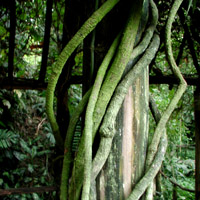
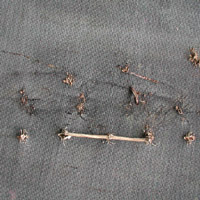
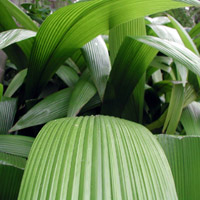
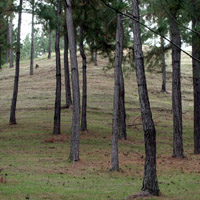
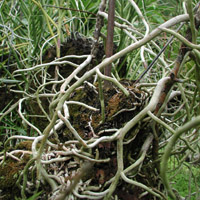
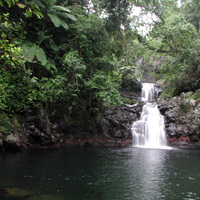
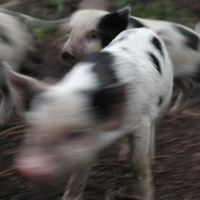

and then there was the underwater world, where instead of a tourist from the wealthiest nation on the planet i became an anonymous visitor to a city full of industrious and mute angels.
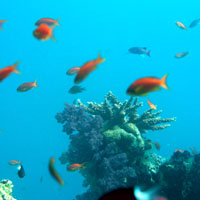
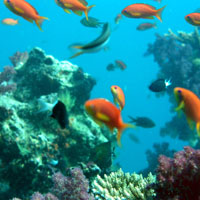
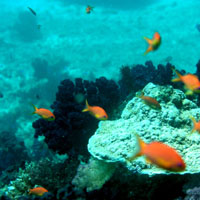
i had a good time diving (and completed all my required courses) and on my last official dive i found a huge underwater field of garden eels. these are eels that are up to a meter long - some as long as my arm - that lift out of the sand. it's easy to mistake them for strands of grass, save for the fact that when you swim near they pull into their undersand caves.
so i emptied all the air out of my BCD and sat crosslegged on the bottom of the sea floor, some couple fathoms down, and was as still as i could be for a good twenty minutes. soon the eels came up and started to wave about in the current, and i felt like a buddha in a forest of dancing snakes.
the next day i took a small video camera back and did a crappy job of capturing them all disappearing. i'm not very good at underwater video, but here's the testimony to my efforts.
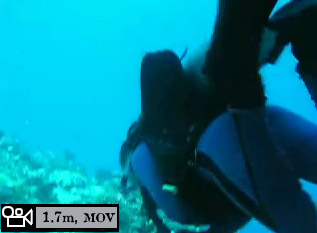
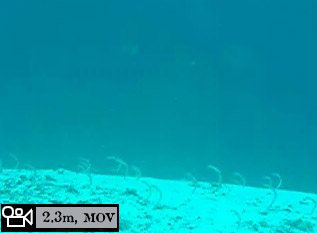
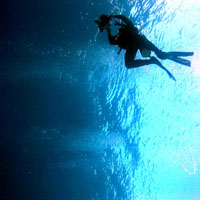
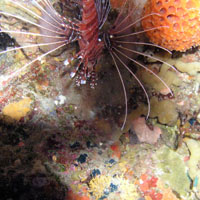
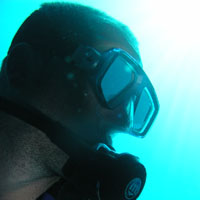
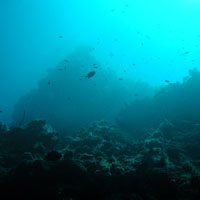
there is so much natural beauty, and the fijian tourism industry (for whatever reasons) is sufficiently segregated, that it's easy to overlook the people.
most of the tattoos that are around there (i understand that tattoos originated in the south pacific, then migrated to japan) are small and all look a bit like notes or doodles you might leave on a notepad while talking on the phone. i didn't understand them. most people have scars like this on their hands. it comes from fishing.

this guy's job, when he's not fishing, is to shuttle tourists around in his boat. he told me things have changed in the last ten years. last year he told a couple of tourists from california that it wasn't safe to take the boat out during low tide - they'd have a hard time getting through a reef and he was worried for their safety. it was, after all, their honey moon and he didn't want it to go sour. the groom, in an apparent display of something like virility for his bride's benefit, spit in the boatman's face.

and this guy, too, the second from the left. his name is samuel matana. he was my instructor and one of maybe a dozen guys i've met in my life that, if satan crawled out of his cellar, i'd want around. he's been spat on also. he told me the key was patience. these guys all work with tourists on the dive sites. if you look carefully you can see that they all have reservoirs of patience. they have to in order to deal with such an imperial influence as tourism.

i was there to bring money, mostly. for me they were there to let me use their land and show me around in the process. and this is how nothing really happened. i was, simply, a tourist; no helping people, no delivery of anything, no warzones, no getting lost and not much talking with strangers. i left them with nothing more than some money, a free lunch, and a few laughs. i spent time in a vacation resort and i was, for ten days, purely and unoriginally touristocratic.
i no more thought to bring imperial values to fiji than abel tasman or james cook did. but as with giving someone you love the flu, sometimes you just can't do otherwise; it's in you and it finds its way out, whether you like it or not.
